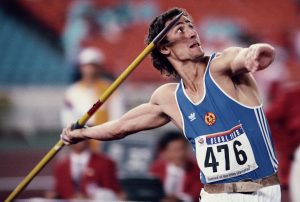Christian Schenk is anything but a household name, but during competition at the 1988 Summer Olympics in Seoul, South Korea he was able to claim the gold-medal while representing East Germany in the decathlon competition.

Just 20 years old when he exploded onto the Olympic scene, dominating the decathlon event in the lead up to the Summer Olympics and continuing to dominate just as soon as he started to go up against legitimate Olympic competition, Schenk contends that he started using steroids and other performance-enhancing drugs all the way back in 1985.
This would have put Schenk at just 17 years old when he is Bulgarian trainers began to “force-feed” him steroids every morning at breakfast, reporting in his new autobiography that German Democratic Republic (GDR) sports officials, medical officials, and trainers were all complicit in making sure that all athletes at this training camp were taking advantage of performance-enhancing drugs.
At the time, Schenk was told that he was consuming a special concoction of vitamins and minerals and that the truth was withheld from for years and years. He does comment on being skeptical about these claims even when he was a young athlete, and that many of the athletes that were training with him were skeptical of these claims as well.
Schenk goes on to state that his skepticism began to increase even more so when he began to notice the dramatic increases in muscle building, strength building, and endurance improving that these performance-enhancing drugs were bringing to the table.
As he writes in his autobiography, he knew that he was doping even though no one explicitly told him. He says that at first he denied to himself that he had ever taken any banned substances, and then settled into a much softer approach – saying to himself that it was okay to take advantage of these performance-enhancing drugs since they were told to be something else entirely by people and coaches that he trusted.
This new autobiography barely glances over these steroid use claims, but already the International Olympic Committee is interested in learning more about what Schenk has to say. The IOC has been clear in its intention NOT to pursue any charges or sanctions against the athlete, making sure that he and anyone else from this era of competition that wants to come forward understands that their statute of limitations would prevent them from being able to strip them of their metals or accomplishments.
The IOC has a strict statute of limitations for investigating performance-enhancing drug use and doping allegations that lasts for just 10 years. Clearly, with claims that are now more than 30 years old, Schenk has nothing to worry about when it comes to losing his position atop the podium at those Summer Olympics in Seoul, South Korea.
A teammate of Schenk, Torsten Voss, will also keep his silver metal that he received during the decathlon event – though he isn’t quite as forthcoming about the steroid use as Schenk is. A Canadian athlete, Mr. David Steen, will be stuck with the bronze medal that he earned during this event and some close to him report that he is quite upset over these new details, feeling he wasn’t able to compete against athletes playing fair on a level playing field.
Steen has always suspected – very vocally, in fact – that both of the East German athletes mentioned above that placed higher than him on the podium were using performance-enhancing drugs. It’s a shame that his allegations weren’t investigated more fully back then and that he is stuck with the bronze medal, though this admission should be a bit of vindication going forward.
Source: https://www.insidethegames.biz/articles/1069473/seoul-1988-olympic-champion-schenk-admits-doping-in-book-and-will-keep-gold


